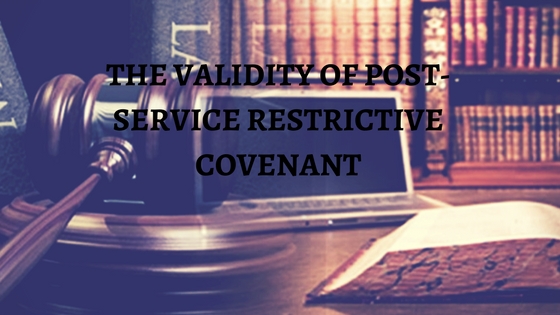Aapka Consultant Judgment Series- In this series, we are providing case analysis of Landmark Judgments of Hon’ble Supreme Court of India.
Superintendence Company of India (P) Ltd. Vs. Sh. Krishan Murgai
AIR1980SC1717, (1981)2SCC246
Hon’ble Judges/Coram: V.D. Tulzapurkar, JJ A.P. Sen and N.L. Untwalia.
Decided On: May 9th, 1980
FACTS:-
The appellant company carries on business as valuers and surveyors undertaking inspection of quality, weighment analysis, sampling of merchandise and commodities, cargoes, industrial products, machinery, textiles etc. It has established a reputation and goodwill in its business by developing its own techniques for quality testing and control and possess trade secrets in the form of these techniques and clientele.
On March 27, 1971, the respondent was employed by the appellant company as the Branch Manager of its New Delhi office on terms and conditions contained in the letter of appointment issued to him on the same date. Clause (10) of the terms and conditions of employment placed the respondent under a post service restraint that he shall not serve any other competitive firm nor carry on business on his own in similar line as that of the appellant company for two years at the place of his last posting. On November 24, 1978, the appellant company terminated the respondent’s services with effect from December 27,1978. Thereafter, respondent started his own business under the name and style of “Superintendence and Surveillance Inspectorate of India” in New Delhi on lines identical with or substantially similar to that of the appellant company. On April 19, 1979 the appellant company brought a suit in the Delhi High Court on its original side, claiming Rs. 55,000/- as damages on account of the breach of negative covenant contained in clause (10); and for permanent injunction restraining the respondent by himself, his servants, agents or otherwise, from carrying on the said business or any other business on lines similar to that of the appellant company or associating or representing any competitors of the appellant company before the expiry of two years from December 27, 1978. After filing the suit the appellant company sought an ad interim injunction by way of enforcing the aforesaid negative covenant and a Single Judge of the Delhi High Court initially granted an ad interim injunction on April 29, 1979 which was confirmed by him on May 25, 1979 after hearing the respondent. On appeal by the respondent, the Division Bench of the High Court reversed the interim order and hence the appeal by certificate.
ISSUE:-
- Whether the said restrictive covenant, if assumed to be valid, is on its terms enforceable against the respondent?
JUDGMENT:-
Court observed that assuming that the negative covenant contained in clause (10) of the service agreement is valid and not hit by section 27 of the Indian Contract Act, it is not enforceable against the respondent at the instance of the appellant company. The appellant company should have taken care to use appropriate language, while incorporating such restrictive covenant so as to include every case of cessation of employment arising from any reason whatsoever and not used the expression “leave”, which normally is synonymous to the expression “quit” and indicates voluntary act on the part of the employee.
The word “leave” has various shades of meaning depending upon the context or intent with which it is used. According to the plain grammatical meaning that word in relation to an employee would normally be construed as meaning voluntary leaving of the service by him and would not include a case where he is discharged or dismissed or his services are terminated by his employer. Ordinarily, the word connotes voluntary action.
In the instant case, having regard to the context in which the expression leave occurs in clause (10) of the service agreement and reading it along with all the other terms of agreement, it is clear that the word “leave” was intended by the parties to refer to a case where the employee voluntarily left the services of his own.
HELD:-
Post-service restrictive covenants are generally unenforceable against the employee if his services are terminated, this being in violation of Section 27 of the Indian Contract Act, 1872.
To Get Legal Opinion from Advocates/ Legal Experts, Please click here
To Get Legal Opinion from Retired Hon’ble Judges, Please click here












